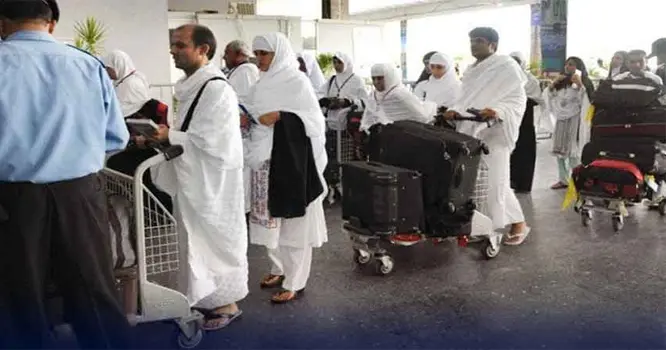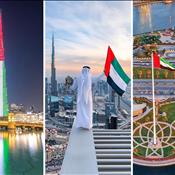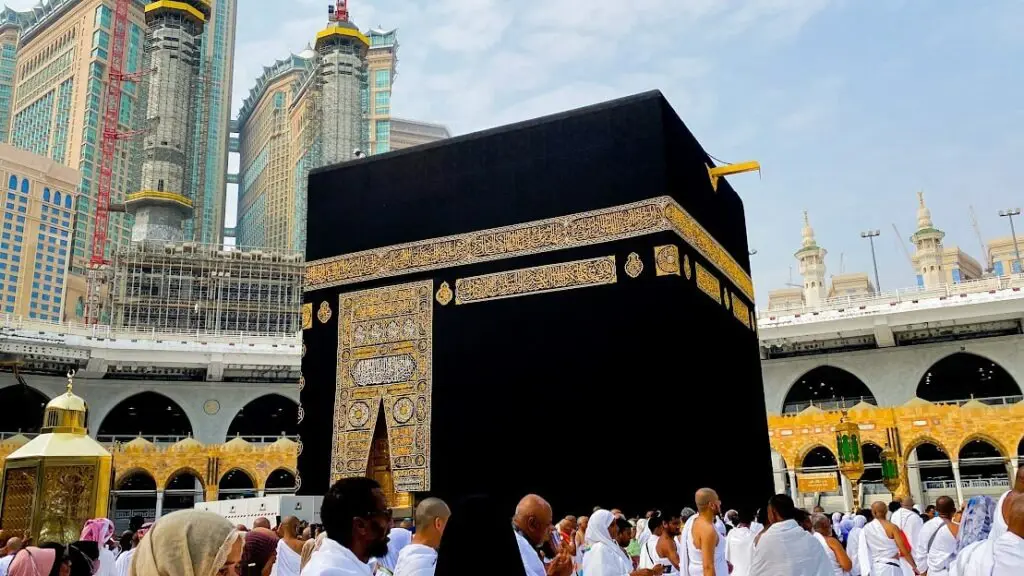
The Hajj season this year has brought unexpected challenges for thousands of Pakistani pilgrims, with over 60,000 aspiring Hajj travelers unable to secure their journey under the private scheme. This setback has sparked widespread concern and frustration, particularly among those who had booked their Hajj packages from Pakistan through authorized private tour operators.
According to Pakistan’s Federal Minister for Religious Affairs, Sardar Yusuf, Hajj flights are scheduled to commence from May 31, 2025, with a total of 89,605 pilgrims proceeding under the government’s official quota. However, under the private Hajj scheme, only around 25,000 Pakistanis will be able to perform Hajj this year—an alarming reduction from the original allocation.
Pakistan had a total Hajj quota of approximately 180,000 for 2025, to be divided equally between the government scheme and private Hajj operators. The drastic shortfall in the private quota has been attributed to procedural delays, policy changes, and operational hurdles faced by Hajj operators in Pakistan.
Why Thousands Missed Out: The Private Hajj Packages Crisis
Federal Minister Yusuf explained that while all requirements for government Hajj were completed on time, private Hajj operators failed to fulfill the necessary obligations. These included timely payments, bookings, and compliance with the new Saudi Hajj portal system introduced for managing services like accommodation and transport.
A significant factor in this disruption was the late return of funds from the Ministry of Religious Affairs to private Hajj operators. Many operators had deposited large sums in Saudi Riyals into the Ministry’s accounts in October 2024, but these were only returned in December and January, leaving little time for operators to make necessary bookings and secure services. By the time funds were released, critical deadlines—such as the February 14 cut-off for finalizing arrangements on the Saudi Hajj portal—had already passed.
This situation left thousands of Pakistani pilgrims who had paid advance amounts for Hajj packages from Pakistan without confirmed bookings or even visas.
Financial Fallout: Operators and Pilgrims in Limbo
For many private Hajj package providers in Pakistan, the financial implications are severe. Several operators had already committed funds for hotel bookings, transport services, and other logistical needs in Saudi Arabia. However, with no visas issued for their clients, these investments are now at risk.
An anonymous private Hajj operator expressed concern, stating, "Most of us have made significant advance payments for services like accommodation and transport. If we cannot recover these costs, many Hajj operators may face financial ruin." He also appealed to the Pakistani government to negotiate with Saudi authorities for possible refunds or adjustments to mitigate losses.
Moreover, Hajj operators who accepted advance payments from pilgrims are now under pressure to return these funds. In many cases, operators are struggling, as they have already spent the money on partial bookings that cannot be refunded. As one operator lamented, "Even if we sell our properties, we won’t be able to fully refund the amounts to our clients."
Personal Stories: Broken Dreams for Pilgrims
For individuals like Muhammad Zahid Khan from Abbottabad, this year’s Hajj was a lifelong dream turned into disappointment. He had paid 75% of his Hajj package cost in January, hoping to embark on the sacred journey. Yet, he was later informed that his visa was never issued, and his trip had been canceled.
Similarly, Rehman Khan from Peshawar shared his anguish over his mother’s canceled Hajj plans. "I paid the full amount for both of us in January. My visa has been issued, but my mother’s has not. She is heartbroken; this was supposed to be her first and perhaps only Hajj."
These stories highlight the emotional toll the situation has taken on thousands of Pakistani families who had saved for years, hoping to fulfill their religious duty.
Government’s Response and Investigation
The Pakistani government has launched an inquiry into the crisis. Prime Minister Shehbaz Sharif has established a special committee to investigate the reasons behind the failure of private Hajj operators and to recommend possible solutions.
A spokesperson for the Ministry of Religious Affairs rejected claims that the government had failed to inform operators about critical deadlines. The spokesperson emphasized that the Hajj policy is approved by the cabinet and that all communications were based on guidelines provided by the Saudi Ministry of Hajj and Umrah.
However, many private Hajj operators insist that the new Saudi policies, introduced last year, were not adequately communicated. The shift to an online portal system for securing services, coupled with Pakistan’s restrictions on dollar outflows, further complicated matters.
Operators also pointed to delays caused by legal actions. Some had obtained a stay order from the Sindh High Court, which temporarily halted the Hajj process. Although the operators later withdrew their petitions, the lost time contributed to the crisis.
The Future of Hajj Packages from Pakistan
The crisis has exposed significant flaws in the management of Hajj packages from Pakistan, especially under the private scheme. Stakeholders now emphasize the need for better coordination between the government, private operators, and the Saudi authorities.
Industry leaders, including the Vice Chairman of the Private Hajj Organizers Association, Ehsanullah, have called for reforms. They suggest that the government should allow earlier bookings and payments, ensure timely refunds to operators, and establish clearer communication channels to avoid such chaos in the future.
Moreover, affected pilgrims are urging the government to intervene and help recover their funds. Some have even demanded a reconsideration of the current quota allocation to ensure that private Hajj operators can continue serving the community effectively.
The current crisis surrounding Hajj packages from Pakistan serves as a cautionary tale for all stakeholders involved. While the government scheme has operated smoothly, the private Hajj sector has faced an unprecedented setback, leaving thousands of Pakistanis heartbroken and financially strained.
As investigations proceed and discussions continue with Saudi authorities, the hope remains that lessons will be learned, and future Hajj seasons will be free from such distress—allowing all Pakistani Muslims to fulfill their spiritual obligation with dignity and peace of mind.
;More Travel News
-
 15-Dec-2022UAE Changes Visit Visa Extension Policy
15-Dec-2022UAE Changes Visit Visa Extension Policy -
 09-Jan-2026Complete Guide to January Umrah Packages from Pakistan 2026
09-Jan-2026Complete Guide to January Umrah Packages from Pakistan 2026 -
 04-Jul-2019Destinations of the world that you can fly to under 1 Lakh from Pakistan
04-Jul-2019Destinations of the world that you can fly to under 1 Lakh from Pakistan -
 14-Sep-2019How you can Get Maximum Benefits from any Travel Insurance Policy in Pakistan
14-Sep-2019How you can Get Maximum Benefits from any Travel Insurance Policy in Pakistan -
 15-Feb-2020Top 10 Cities in the World For Your New Tourist Destination
15-Feb-2020Top 10 Cities in the World For Your New Tourist Destination -
 28-Oct-2024Umrah Packing List: What to Take for Umrah
28-Oct-2024Umrah Packing List: What to Take for Umrah -
 14-Jun-2022Saudi Arabia Removes All Restrictions Of Covid Ahead of Hajj
14-Jun-2022Saudi Arabia Removes All Restrictions Of Covid Ahead of Hajj -
 21-Apr-2024Islamabad to Muscat: New low-cost route launched by Fly Jinnah
21-Apr-2024Islamabad to Muscat: New low-cost route launched by Fly Jinnah -
 11-Mar-2025Umrah 2025 Special: 15-Day Packages with Up to 20% Off
11-Mar-2025Umrah 2025 Special: 15-Day Packages with Up to 20% Off -
 06-Mar-2025Winter Wonderlands: Family Trips to Cozy Destinations
06-Mar-2025Winter Wonderlands: Family Trips to Cozy Destinations -
 02-Jun-2021Why Turkey Is A World's Best Tourist Attraction
02-Jun-2021Why Turkey Is A World's Best Tourist Attraction -
 26-Jun-2025Journey of Faith Unbound: Saudi Arabia Allows Women to Perform Umrah Without Mahram in 2025
26-Jun-2025Journey of Faith Unbound: Saudi Arabia Allows Women to Perform Umrah Without Mahram in 2025
